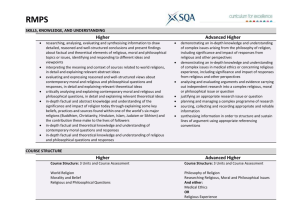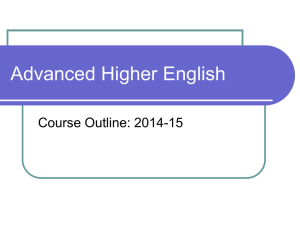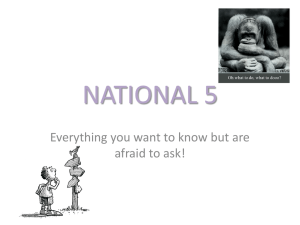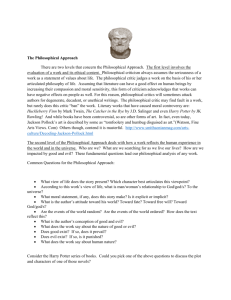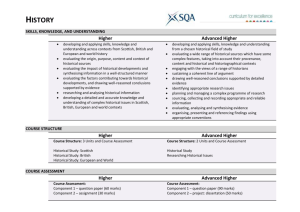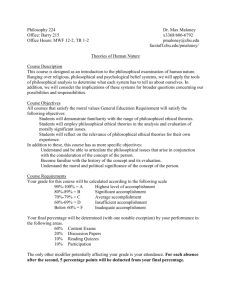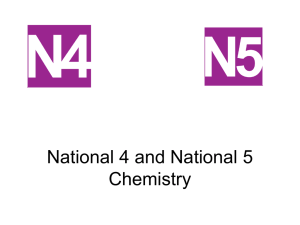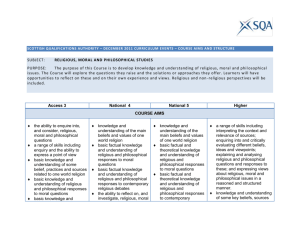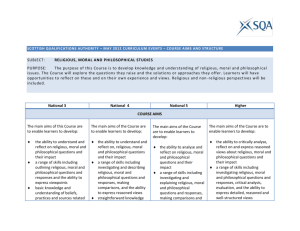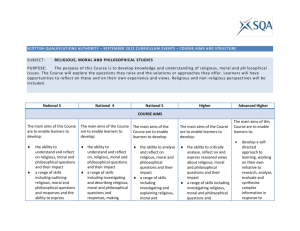Skills, Knowledge, and Understanding
advertisement
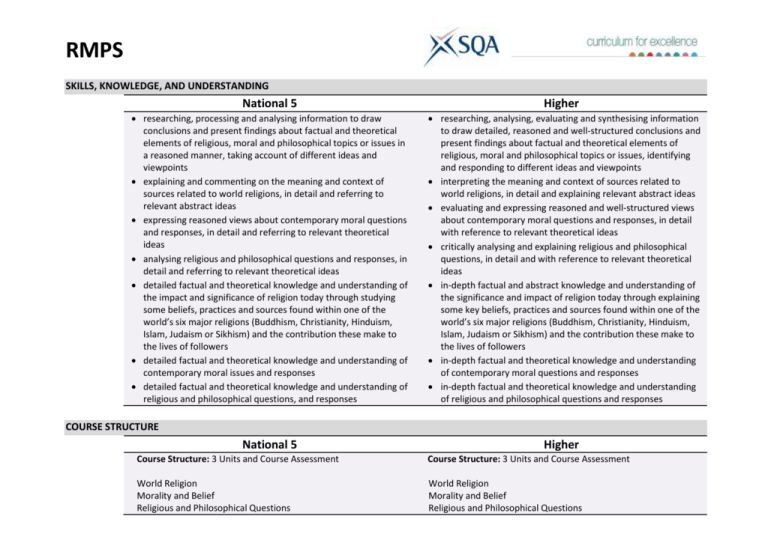
RMPS SKILLS, KNOWLEDGE, AND UNDERSTANDING National 5 Higher researching, processing and analysing information to draw conclusions and present findings about factual and theoretical elements of religious, moral and philosophical topics or issues in a reasoned manner, taking account of different ideas and viewpoints explaining and commenting on the meaning and context of sources related to world religions, in detail and referring to relevant abstract ideas expressing reasoned views about contemporary moral questions and responses, in detail and referring to relevant theoretical ideas analysing religious and philosophical questions and responses, in detail and referring to relevant theoretical ideas detailed factual and theoretical knowledge and understanding of the impact and significance of religion today through studying some beliefs, practices and sources found within one of the world’s six major religions (Buddhism, Christianity, Hinduism, Islam, Judaism or Sikhism) and the contribution these make to the lives of followers detailed factual and theoretical knowledge and understanding of contemporary moral issues and responses detailed factual and theoretical knowledge and understanding of religious and philosophical questions, and responses researching, analysing, evaluating and synthesising information to draw detailed, reasoned and well-structured conclusions and present findings about factual and theoretical elements of religious, moral and philosophical topics or issues, identifying and responding to different ideas and viewpoints interpreting the meaning and context of sources related to world religions, in detail and explaining relevant abstract ideas evaluating and expressing reasoned and well-structured views about contemporary moral questions and responses, in detail with reference to relevant theoretical ideas critically analysing and explaining religious and philosophical questions, in detail and with reference to relevant theoretical ideas in-depth factual and abstract knowledge and understanding of the significance and impact of religion today through explaining some key beliefs, practices and sources found within one of the world’s six major religions (Buddhism, Christianity, Hinduism, Islam, Judaism or Sikhism) and the contribution these make to the lives of followers in-depth factual and theoretical knowledge and understanding of contemporary moral questions and responses in-depth factual and theoretical knowledge and understanding of religious and philosophical questions and responses COURSE STRUCTURE National 5 Course Structure: 3 Units and Course Assessment World Religion Morality and Belief Religious and Philosophical Questions Higher Course Structure: 3 Units and Course Assessment World Religion Morality and Belief Religious and Philosophical Questions COURSE ASSESSMENT National 5 Higher Course Assessment: Component 1 – question paper (60 marks) Component 2 – assignment (20 marks) Course Assessment: Component 1 – question paper (60 marks) Component 2 – assignment (30 marks) Question Paper Section 1: World Religion will have 20 marks. Section 2: Morality and Belief will have 20 marks. Section 3: Religious & Philosophical Questions will have 20 marks. Question Paper Section 1: World Religion will have 20 marks. Section 2: Morality and Belief will have 20 marks. Section 3: Religious & Philosophical Questions will have 20 marks. This question paper will be set and marked by SQA, and conducted in centres under conditions specified for external examinations by SQA. Learners will complete this in one hour and 30 minutes. This question paper will be set and marked by SQA, and conducted in centres under conditions specified for external examinations by SQA. Learners will complete this in 2 hours and 15 minutes. Assignment This assignment will give learners an opportunity to demonstrate the following skills, knowledge and understanding: identifying an appropriate religious, moral or philosophical topic or issue for study researching the topic or issue, using a range of sources of information including different viewpoints, at least one of which must be religious analysing information in a structured manner drawing on detailed factual and theoretical knowledge and understanding to explain and analyse key features of the topic or issue commenting on the significance or impact of the topic or issue to the contemporary world drawing and presenting a detailed and reasoned conclusion on the topic or issue, with reference to both supporting information and potential challenges or counter-arguments Assignment This assignment will give learners an opportunity to demonstrate the following skills, knowledge and understanding: identifying an appropriate religious, moral or philosophical studies topic or issue for study, about which there are alternative or different points of view researching the topic or issue, using a range of sources of information identifying and evaluating different viewpoints on the topic or issue, at least one of which must be religious analysing and synthesising information in a structured manner drawing on in-depth knowledge and understanding to analyse and evaluate the topic or issue explaining the significance or impact of the topic or issue to the contemporary world drawing and presenting a reasoned and well-structured conclusion on the topic or issue, with a detailed explanation of both supporting information and potential challenges or counter-arguments The assignment is set by centres within SQA guidelines and conducted under a high degree of supervision and control. Evidence will be submitted to SQA for external marking. The assignment is set by centres within SQA guidelines and conducted under a high degree of supervision and control. Evidence will be submitted to SQA for external marking.
